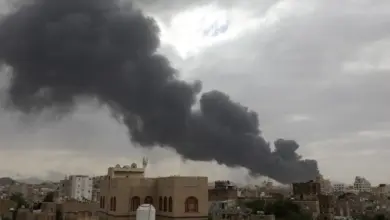SANAA – Yemeni security forces on Monday killed 20 people, including three dissident soldiers and two children, raising the death toll to 46 since Sunday, medics said, as protesters thronged Sanaa's streets.
The wave of bloodletting coincided with the arrival in Sanaa of the UN's envoy to Yemen Jamal Benomar and the Gulf Cooperation Council (GCC) chief Abdullatif al-Zayani for what a diplomat said was the signing of a UN roadmap for transfer of power from embattled President Ali Abdullah Saleh to his deputy.
"Twenty people, including two children and three soldiers from the First Armoured Brigade" were killed in Sanaa, a medic said, referring to a military unit headed by dissident General Ali Mohsen al-Ahmar.
The medics could not say where most of the bodies were arriving from but witnesses said security forces opened fire on protesters camping out at al-Zubair Road, near to Change Square, the epicentre of anti-regime protests in Sanaa.
The protesters retaliated by throwing stones at the security forces, sparking fresh bursts of gunfire, the witnesses said.
The children, identified as Anas and Louay al-Suaidi, were shot dead by snipers as they travelled by car with their parents on a road west of Change Square, their mother said.
On Sunday, a march by tens of thousands of protesters from Change Square to the center of the capital ended in chaos when they came under heavy fire by the security forces at al-Zubair Road, which is near the office of Saleh's son Ahmed, head of the elite Republican Guard units.
Witnesses said the protesters were sprayed by water cannons and tear gas, and baton charged before the security forces opened fire with machineguns.
Medics reported 26 people killed and 500 wounded by live rounds, batons or after inhaling tear gas in Sunday's clashes.
Early Monday, thousands of protesters staged another march from Change Square to join the tens of thousands who had camped at Al-Zubair Road following Sunday's deadly clashes.
Two protesters were also killed in the flashpoint city of Taez, south of Sanaa, witnesses said.
State news agency Saba reported the UN envoy Benomar arrived Monday at Sanaa while an airport official told AFP that GCC Secretary General Abdullatif al-Zayani too had flown into the restive capital.
A Western diplomat in Sanaa told AFP that the signing of the UN roadmap was scheduled for later Monday.
A high-level Saudi official told AFP on Saturday that Vice President Abdrabuh Mansur Hadi will sign a Gulf-brokered initiative "within a week" after the United States on Thursday said that this is what it had "hoped" would happen.
Saleh, who has ruled Yemen since 1978, has been recovering in Saudi Arabia from a June 3 attack on his presidential compound, but has so far refused to hand power to his deputy or to sign the Gulf Initiative.
His refusal has angered the plan's Gulf sponsors who, along with many in the international community, fear that a total meltdown of political order in Yemen could pave the way for Al-Qaeda-linked militants to overrun the country.
The GCC plan, proposed last spring, calls on Saleh to step down as president and hand over all constitutional authorities to Hadi. In return, Saleh would receive amnesty from prosecution for himself and his family.
Yemen's government on Monday expressed its "sorrow and condemnation" of the latest violence and promised an investigation.
"The government of Yemen expresses its sorrow and condemnation for all acts of violence and bloodshed as those happened yesterday in Sanaa," Foreign Minister Abu Bakr al-Qurbi told the UN Human Rights Council in Geneva.
"It is unfortunate that these events occurred at a time while some solutions for the political crisis started to appear," said the minister.
Oxfam said in a statement, meanwhile, that one in every three Yemeni goes hungry every day because of the months-long political stalemate that has pushed the economy to the verge of collapse and the government toward total paralysis.
"Widespread hunger and chronic malnutrition have taken hold in Yemen," the international charity said in a report on the country of 22 million.



